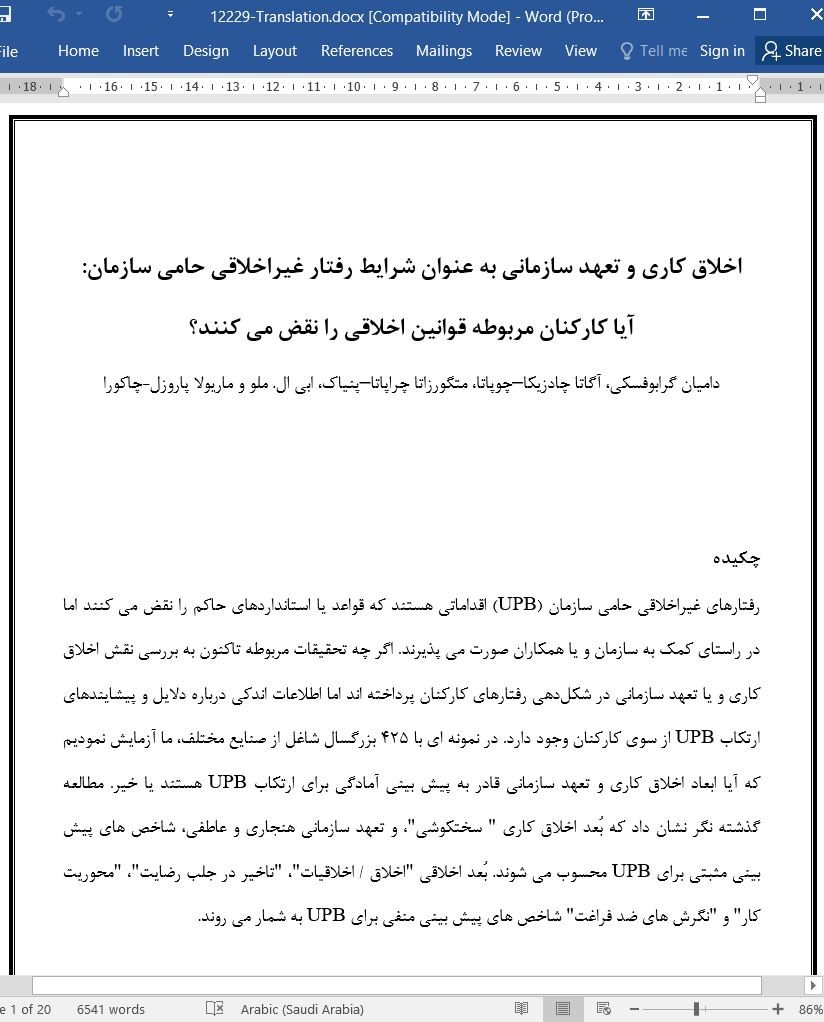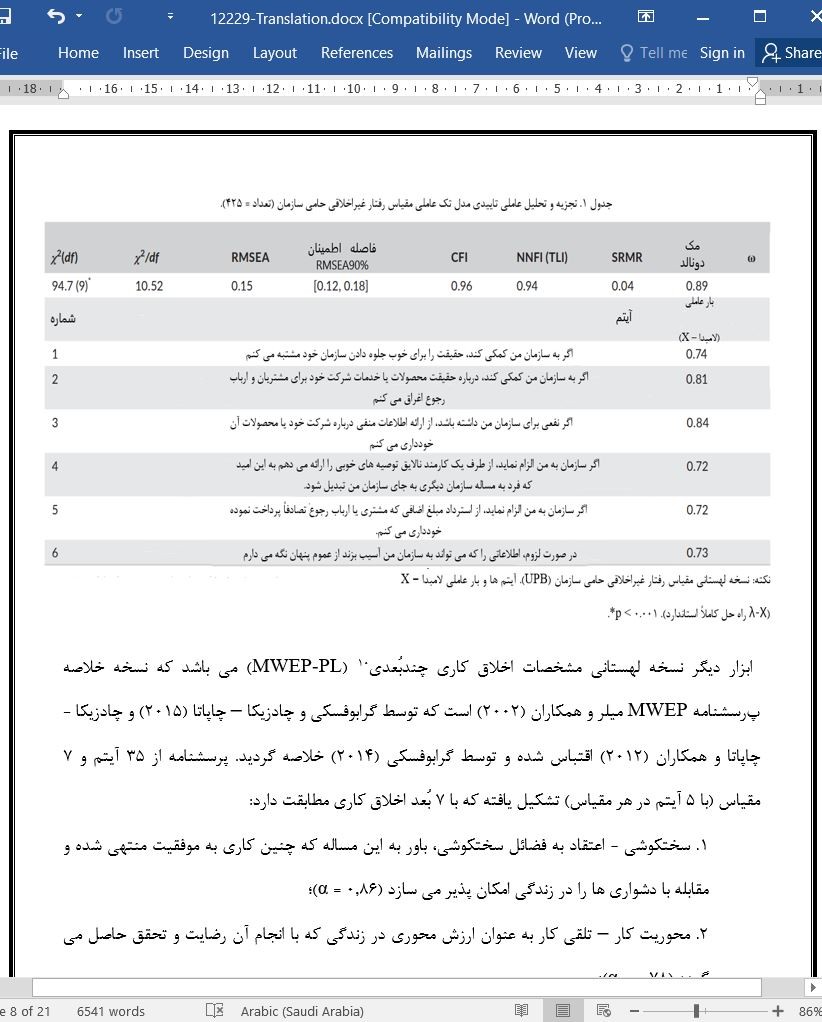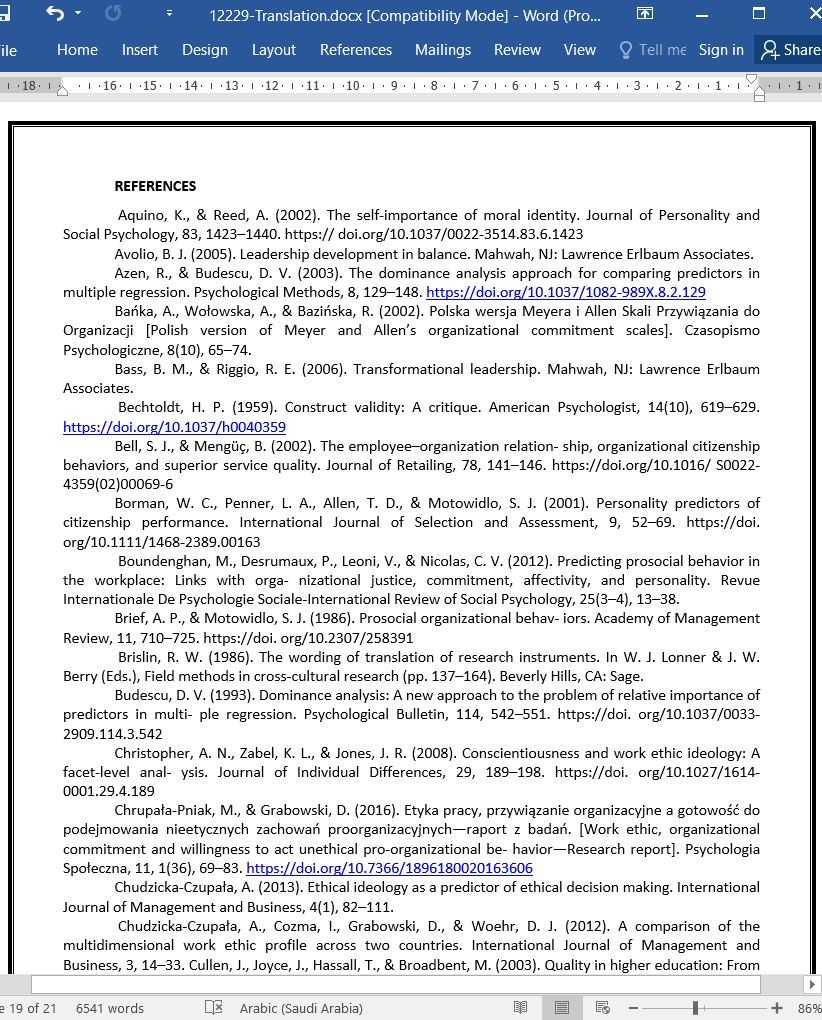
اخلاق کاری و تعهد سازمانی به عنوان شرایط رفتار غیراخلاقی حامی سازمان
چکیده
رفتارهای غیراخلاقی حامی سازمان (UPB) اقداماتی هستند که قواعد یا استانداردهای حاکم را نقض می کنند اما در راستای کمک به سازمان و یا همکاران صورت می پذیرند. اگر چه تحقیقات مربوطه تاکنون به بررسی نقش اخلاق کاری و یا تعهد سازمانی در شکلدهی رفتارهای کارکنان پرداخته اند اما اطلاعات اندکی درباره دلایل و پیشایندهای ارتکاب UPB از سوی کارکنان وجود دارد. در نمونه ای با ۴۲۵ بزرگسال شاغل از صنایع مختلف، ما آزمایش نمودیم که آیا ابعاد اخلاق کاری و تعهد سازمانی قادر به پیش بینی آمادگی برای ارتکاب UPB هستند یا خیر. مطالعه گذشته نگر نشان داد که بُعد اخلاق کاری " سختکوشی"، و تعهد سازمانی هنجاری و عاطفی، شاخص های پیش بینی مثبتی برای UPB محسوب می شوند. بُعد اخلاقی "اخلاق / اخلاقیات"، "تاخیر در جلب رضایت"، "محوریت کار" و "نگرش های ضد فراغت" شاخص های پیش بینی منفی برای UPB به شمار می روند.
1. مقدمه
تعداد رو به رشد مطالعات بیانگر توجه فزاینده دانشپژوهان به مفهوم رفتار غیراخلاقی حامی سازمان (UPB) (تسیاویا، 2016) از زمان انتشار اولیه مقاله اصلی آمفرس، بینگهام و میچل (2010) می باشد. از آنجا که موضوع مزبور امری متداول و پرهزینه برای سازمان هاست، به یک میزان مورد توجه دستاندرکاران و دانشپژوهان قرار گرفته است (مترن، ایل و لیچفیلد، 2012). تا به امروز، شواهد تجربی اندکی دال بر رابطه بین UPB و تعلق خاطر به رهبر یا سازمان ارائه شده است (افلزبرگ، سولگا و گرت، 2014؛ کونگ، 2016). با این حال، بین اخلاق کاری (وبر، 1958) و تعهد سازمانی (میر و آلن، 1991) و مطالعه UPB شکافی وجود دارد. تحقیق حاضر ضمن پر نمودن شکاف مزبور، شواهد جدیدی را درباره پیشایندهای UPB ارائه می کند.
3.4. محدودیت های مطالعه و جهت گیری های تحقیقاتی آتی
مطالعه حاضر دارای محدودیت هایی برای تایید آن است. محدودیت اصلی این واقعیت است که مطالعه مزبور تنها برای کارکنان لهستانی اجرا گردید. بنابراین، سوالی که مطرح می شود این است که آیا نتیجه دریافتی منوط به فرهنگ لهستانی بوده یا در کشورهای دیگر نیز صدق می کند؟ برای پاسخ به این پرسش، تحقیقات بین فرهنگی گسترده تری شامل کشورهای دیگر نیز باید انجام پذیرد. امکان دارد در فرهنگ خاص تر لهستان نسبت به فرهنگ عام تر آمریکا (ترامپینارز و همپدن – ترنز، 1997)، روابط بین تعهد سازمانی و UPB که در تحقیقات آمفرس و همکاران (2010) مطرح شده مشهودتر باشد. ارتباطات بین تعهد سازمانی و UPB در تحقیقات ما قوی تر از رابطه بین تعلق خاطر سازمانی و تمایل برای مشارکت در UPB در تحقیقات آمفرس و همکاران (2010) هستند. باید تاکید نمود که UPB زیربنای دیدگاه خاص گرایی است که در آن افراد بیشتر بر روی روابط (اهداف سازمانی) تمرکز دارند تا قواعد زیرا اخلاق درونی سازمانی که اجازه UPB را می دهد مهم تر از اخلاق عام گرای نظام اجتماعی باشد که UPB را منع می نماید.
Abstract
Unethical pro-organizational behaviors (UPB) are actions that break rules or established standards, but are undertaken for the purposes of helping the organization or coworkers. Although research has already examined the role of work ethic and organizational commitment in shaping employee behaviors, little is known about the reason for and antecedents of employees undertaking UPB. In a sample of 425 working adults from multiple industries, we tested whether work ethic and organizational commitment dimensions predict the readiness to undertake UPB. The time-lagged study showed that the work ethics dimension “hard work,” and normative and affective organizational commitment, are positive predictors of UPB. The ethics dimensions “morality/ethics,” “delay of gratification,” “centrality of work” and “anti-leisure attitudes” are negative predictors of UPB.
1 INTRODUCTION
A growing number of studies show increasing scholarly interest in the concept of unethical pro‐organizational behavior (UPB) (Tsiavia, 2016), since the first publication of the original article by Umphress, Bingham, and Mitchell (2010). Because it is common and costly for organizations, the subject is of interest to practitioners and schol‐ ars alike (Matherne, III & Litchfield, 2012). To date, there is empiri‐ cal evidence that confirms relations between UPB and identification with the leader or organization (Effelsberg, Solga, & Gurt, 2014; Kong, 2016). Yet, there is a gap between work ethic (Weber, 1958) and organizational commitment (Meyer & Allen, 1991) and the study of UPB. The present research fills this gap and provides new evi‐ dence on the antecedents of UPBs.
3.4 Limitations of the study and future research directions
This study has some limitations to acknowledge. The main constraint is the fact that it was carried out on Polish employees only. Thus, a question arises whether the result received is typical of the Polish cul‐ ture or does it also apply to other countries? To answer this question, more extended cross‐cultural research comprising other countries should be conducted. It is possible that in the Polish, more particu‐ laristic culture than universalistic American culture (Trompenaars & Hampden‐Turner, 1997), relations between organizational commit‐ ment and UPB are more visible, which can be suggested in research of Umphress and colleagues (2010). Connections between organi‐ zational commitment and UPB are stronger in our research than relations between organizational identification and willingness to engage in UPB in the research of Umphress and colleagues (2010). It should be highlighted that UPB underlines a perspective of parti‐ curalism, where people are more focused on relationships (organi‐ zational aims) than on rules, because inner morality of organization allowing UPB becomes more important than universalistic morality of the social system forbidding UPB.
چکیده
1. مقدمه
1.1. رفتار غیراخلاقی حامی اجتماع
1.2. تعهد سازمانی
1.3. اخلاق کاری
2. روش
2.1. نمونه و روند مطالعه
2.2. معیارها
3. نتایج
3.1. تجزیه و تحلیل های مقدماتی. خصوصیات روانشناختی نسخه لهستانی مقیاس UPB-PL
3.1.1. تجزیه و تحلیل رگرسیون و همبستگی ها
3.2. تجزیه و تحلیل تعقیبی
3.3. بحث
3.4. محدودیت های مطالعه و جهت گیری های تحقیقاتی آتی
منابع
Abstract
1.INTRODUCTION
1.1.Unethical pro‐social behavior
1.2.Organizational commitment
1.3.Work ethic
2.METHOD
2.1.Study sample and procedure
2.2.Measures
3.RESULTS
3.1.Preliminary analyses. Psychometric characteristics of the Polish version of UPB‐PL scale
3.1.1.Correlations and regression analyses
3.2.Post hoc analyses
3.3.Discussion
3.4.Limitations of the study and future research directions
REFERENCES
- اصل مقاله انگلیسی با فرمت ورد (word) با قابلیت ویرایش
- ترجمه فارسی مقاله با فرمت ورد (word) با قابلیت ویرایش، بدون آرم سایت ای ترجمه
- ترجمه فارسی مقاله با فرمت pdf، بدون آرم سایت ای ترجمه



